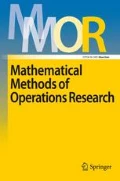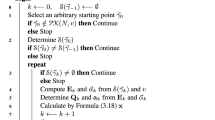Abstract
In this paper we show that many results on equilibria in stochastic games arising from economic theory can be deduced from the theorem on the existence of a correlated equilibrium due to Nowak and Raghavan. Some new classes of nonzero-sum Borel state space discounted stochastic games having stationary Nash equilibria are also presented. Three nontrivial examples of dynamic stochastic games arising from economic theory are given closed form solutions.
Similar content being viewed by others
References
Amir R (1996) Continuous stochastic games of capital accumulation with convex transitions. Games Econ Behav 15:111–131
Bertsekas DP, Shreve SE (1978) Stochastic optimal control: the discrete time case. Academic, New York
Blackwell D (1965) Discounted dynamic programming. Ann Math Stat 36:226–235
Chakrabarti SK (1999) Markov equilibria in discounted stochastic games. J Econ Theory 85:294–327
Cooper R, John A (1988) Coordinating coordination failures in Keynesian models. Quart J Econ CIII:441–464
Curtat LO (1996) Markov equilibria of stochastic games with complementarities. Games Econ Behav 17:177–199
Diamond P (1982) Aggregate demand management in search equilibrium. J Polit Econ 90:881–894
Dutta PK, Sundaram RK (1992) Markovian equilibrium in a class of stochastic games: existence theorems for discounted and undiscounted models. Econ Theory 2:197–214
Gabay D, Moulin H (1980) On the uniqueness and stability of Nash equilibria in noncooperative games. In: Bensoussan A, Kleindorfer P, Tapiero C (eds) Applied stochastic control in econometrics and management science. North-Holland, Amsterdam, pp 271–293
Filar JA, Schultz TA, Thuijsman F, Vrieze OJ (1991) Nonlinear programming and stationary equilibria in stochastic games. Math Program 50:227–237
Filar J, Vrieze K (1997) Competitive Markov decision processes. Springer, New York
Horst U (2004) Stability of linear stochastic difference equations in strategically controlled random environments. Adv Appl Probab 35:961–981
Horst U (2005) Stationary equilibria in discounted stochastic games with weakly interacting players. Games Econ Behav 51:83–108
Klein E, Thompson AC (1984) Theory of correspondences. Wiley, New York
Milgrom P, Roberts J (1990) Rationalizability, learning, and equilibrium in games with strategic complementarities. Econometrica 58:1255–1277
Nash J (1951) Non-cooperative games. Ann Math 54:286–295
Neveu J (1965) Mathematical foundations of the calculus of probability. Holden-Day, San Francisco
Nowak AS (2003a) On a new class of nonzero-sum discounted stochastic games having stationary Nash equilibrium points. Int J Game Theory 32:121–132
Nowak AS (2003b) N-person stochastic games: extensions of the finite state space case and correlation. In: Neyman A, Sorin S (eds) Stochastic games and applications, NATO science series, series C: mathematical and physical sciences, vol 570. Kluwer, Dordrecht, pp 93–106
Nowak AS, Jaśkiewicz A (2005) Nonzero-sum semi-Markov games with the expected average payoffs. Math Meth Oper Res 62:23–40
Nowak AS, Raghavan TES (1992) Existence of stationary correlated equilibria with symmetric information for discounted stochastic games. Math Oper Res 17:519–526
Rieder U (1979) Equilibrium plans for non-zero-sum Markov games. In: Moeschlin O, Pallaschke D (eds) Game theory and related topics. North-Holland, Amsterdam, pp 91–102
Topkis DM (1978) Minimizing a submodular function on a lattice. Oper Res 26:305–321
Topkis DM (1979) Equilibrium points in nonzero-sum n-person submodular games. SIAM J Control Optim 17:773–787
Topkis DM (1998) Supermodularity and complementarity. Princeton University Press, Princeton
Author information
Authors and Affiliations
Corresponding author
Additional information
Research partially supported by MNSW grant 1 P03A 01030.
Rights and permissions
About this article
Cite this article
Nowak, A.S. On stochastic games in economics. Math Meth Oper Res 66, 513–530 (2007). https://doi.org/10.1007/s00186-007-0167-8
Received:
Revised:
Published:
Issue Date:
DOI: https://doi.org/10.1007/s00186-007-0167-8




